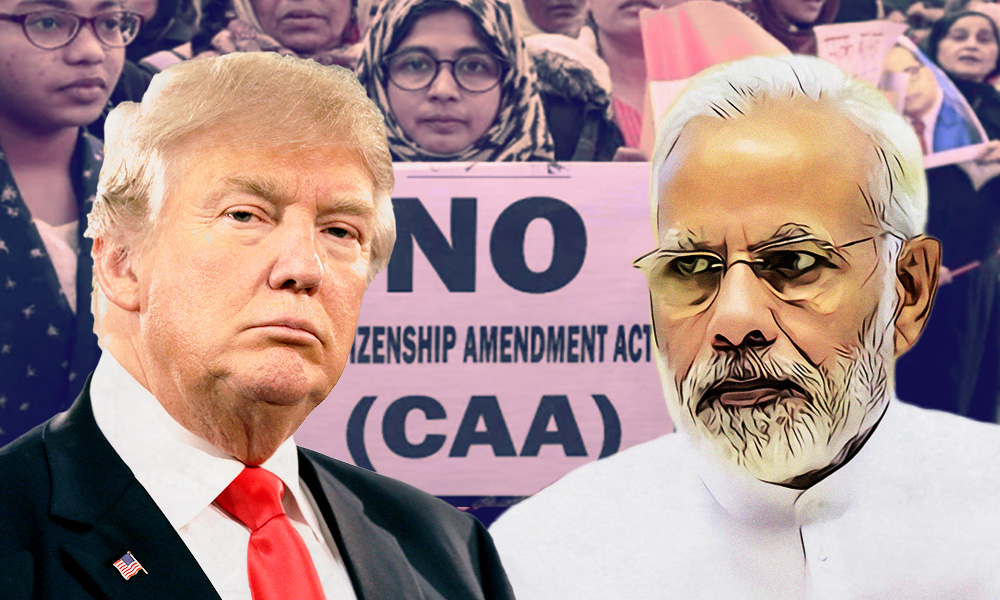
'India Should Be Placed On Religious Freedom Blacklist': US Panel
Writer: Navya Singh
Navya writes and speaks about matters that often do not come out or doesn’t see daylight. Defense and economy of the country is of special interest to her and a lot of her content revolves around that.
India, 29 April 2020 8:53 AM GMT | Updated 29 April 2020 9:24 AM GMT
Editor : Prateek Gautam |
A free soul who believes that journalism, apart from politics, should stand for social cause and the environment.
Creatives : Abhishek M |
" An engineer by profession, Abhishek is the creative producer of the team, graphic designing is his passion and travelling his get away. In more ways than one, he makes the content visually appealing."
By : Abhishek M
" An engineer by profession, Abhishek is the creative producer of the team, graphic designing is his passion and travelling his get away. In more ways than one, he makes the content visually appealing."
Responding to the scathing remarks, India said that the USCIRF is "an organisation of particular concern" and it's "misrepresentation has reached new levels".
A United States panel has noted a "sharp downward turn" in religious freedom in India in 2019, labelling the country of "particular concern" for the first time since 2004.
The United States Commission on International Religious Freedom advised the Department of State to impose "targeted sanctions" against the Indian government and officials behind the violations of religious freedom in the country.
USCIRF Chair @tperkins discusses #India saying "We are seeing impunity for violence by non-state actors committed against religious minorities." #USCIRFAnnualReport2020
— USCIRF (@USCIRF) April 28, 2020
"In 2019, following the Bharatiya Janata Party's re-election in May, the national government used its strengthened parliamentary majority to institute national level policies violating religious freedom across India, especially for Muslims," the report said.
Responding to these allegations, India said that the USCIRF is "an organisation of particular concern" and that the panel's "misrepresentation has reached new levels".
"We reject the observations on India in the USCIRF Annual Report. Its biased and tendentious comments against India are not new. But on this occasion, its misrepresentation has reached new levels. It has not been able to carry its own Commissioners in its endeavour. We regard it as an organisation of particular concern and will treat it accordingly," India's external affairs ministry said.
During the release of its annual report for 2020, USCIRF Vice Chair Nadine Maenza said that India had seen "the steepest, and most alarming, deterioration" in religious freedom in 2019.
"Perhaps the steepest, and most alarming, deterioration in religious freedom conditions was in #India, the largest democracy in the world." USCIRF Vice Chair @nadinemaenza #USCIRFAnnualReport2020
— USCIRF (@USCIRF) April 28, 2020
The panel blamed the Indian government for "permitting violence against minorities and their houses of worship to continue with impunity, and also engaged in and tolerated hate speech and incitement to violence".
The sanctions suggested by the commission included the freezing of the assets of officials responsible for such acts, or restricting their entry into the United States.
India was listed as one of 14 "countries of particular concern" because their governments "engage in or tolerate systematic, ongoing, egregious violations", the USCIRF said. These included countries such as Myanmar, China, Iran, North Korea, Pakistan and Saudi Arabia.
Fifteen countries were also recommended to be put under watch list for "severe violations".
Countries of Particular Concern in #USCIRFAnnualReport2020: Burma, China, Eritrea, India, Iran, Nigeria, North Korea, Pakistan, Russia, Saudi Arabia, Syria, Tajikistan, Turkmenistan, and Vietnam
— USCIRF (@USCIRF) April 28, 2020
Two of the nine commissioners on the US panel expressed their disagreement over placing India in the category of "particular concern". One of the commissioners, Gary L Bauer, claimed that this would position India in "a gallery of rogue nations in which it does not belong".
He said that India is "not the equivalent of communist China, which wages war on all faiths; nor of North Korea, a prison masquerading as a country; nor of Iran, whose Islamic extremist leaders regularly threaten to unleash a second Holocaust".
India has often rejected and dismissed views expressed by the US panel which are non-binding to the state department. For more than a decade, India has denied visas to members of the USCIRF.
Early in February, when India's nation capital was jolted with communal violence, the commission expressed concerns over the clashes. However, India dismissed the commissions' remarks calling them factually incorrect and misleading.
"In February 2020, three days of violence erupted in Delhi with mobs attacking Muslim neighborhoods. There were reports of Delhi police, operating under the Home Ministry's authority, failing to halt attacks and even directly participating in the violence," the commission said in the report.
In December as well, the commission had said it was "deeply troubled" as the Citizenship Amendment Act was passed in the Indian Parliament and had sought sanctions against Union Home Minister Amit Shah.
"Home Minister Amit Shah referred to migrants as 'termites' to be eradicated... in Uttar Pradesh, the BJP chief minister Yogi Adityanath pledged 'revenge' against anti-CAA protestors and stated they should be fed 'bullets not biryani'," it said.
Also Read: Around 350 Tablighi Jamaat Members Who Recovered From COVID-19 To Donate Plasma
 All section
All section














